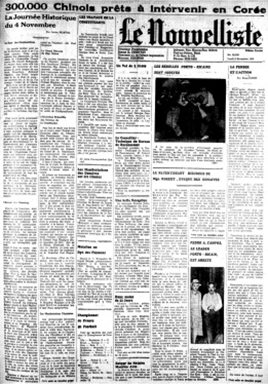"Women and the Vote" by Grace Sanders
Sanders is a doctoral candidate in the Department of History at the University of Michigan. Her dissertation is on the women’s movement in Haiti.
At the end of the U.S. Occupation in 1934, Haitian women were among many citizens who sought to shape Haiti’s future. Although women were vital contributors to the national economy and culture as market vendors, domestic workers, agronomists, artists, spiritual leaders, and educators, they did not have the right to vote.
 In 1934, a group of elite and middle-class women committed themselves to fighting for women’s rights by founding the feminist organization La Ligue Feminine d’Action Sociale (LFAS). Led by Madeleine Sylvain Bouchereau and Alice Garoute, LFAS members argued that the future of the nation depended on gender equality. This meant improving women’s education, expanding civil rights, and demanding universal suffrage. In 1936 members of the LFAS championed modifications in legislation regarding wage compensation for married women. Although married women were not allowed to hold their own wages until 1944, the proposed legislation aroused heated debates about women’s changing roles in Haitian society and politics. As leaders of the suffrage campaign, LFAS members encouraged these changes and viewed them as improvements for women and the nation. However, men and women wedded to patriarchal norms argued that women were inferior to men and therefore unqualified for politics and voting.
In 1934, a group of elite and middle-class women committed themselves to fighting for women’s rights by founding the feminist organization La Ligue Feminine d’Action Sociale (LFAS). Led by Madeleine Sylvain Bouchereau and Alice Garoute, LFAS members argued that the future of the nation depended on gender equality. This meant improving women’s education, expanding civil rights, and demanding universal suffrage. In 1936 members of the LFAS championed modifications in legislation regarding wage compensation for married women. Although married women were not allowed to hold their own wages until 1944, the proposed legislation aroused heated debates about women’s changing roles in Haitian society and politics. As leaders of the suffrage campaign, LFAS members encouraged these changes and viewed them as improvements for women and the nation. However, men and women wedded to patriarchal norms argued that women were inferior to men and therefore unqualified for politics and voting.
In 1946, the arguments against women’s suffrage became particularly aggressive. During the constitutional assembly of that year, Senators Emile St-Lôt and Castel Démesmin maintained that Haitian women should be denied the right to vote because they were "all prostitutes," "bad mothers," and pawns of the foreign Catholic clergy. Disappointed by the attacks on Haitian women’s sexuality and motherhood, Alice Garoute and other women’s suffragists stormed out of the assembly in the middle of the debate. In the days following the assembly, LFAS members Cléante Desgraves Valcin, Madeleine Sylvain Bouchereau, Alice Garoute, Yvonne Hakime Rimpel, and Marie-Thérèse Pointevien channeled their frustration into a series of essays titled, "La Femme Haïtienne répond aux attaques formulées contre elle à l’Assemblée Constituante." Among their grievances with certain members of the Constitutional Assembly, they bemoaned the irony of the attacks on Haitian women’s character given that women often orchestrated the affairs of the home while working outside the home to advance the economic, social, and political needs of their families and communities.
The opposition to women’s suffrage was extensive, but the women were undaunted. The suffragists’ resolve was strengthened by the support of allies in political parties and other women’s organizations including the Association des femmes Haïtiennes pour l’Organisation du Travail, Les Amis de la Maison, the Foyer Ouvrier, the Comité d’Action Féminine, the Parti Populaire Chrétien, and the Parti Socialiste Populaire. Haitian women also rallied the support of international groups such as the Commission Interaméricanine de Femmes de l’Union Panaméricaine, the Ligue Internationale des femmes pour la Paix et Pour la Liberte, the National Council of Negro Women, and the United Nations. In April 1950, LFAS members demonstrated the strength of the suffrage campaign by organizing the First National Congress of Haitian Women. Over 500 congress delegates from forty-three Haitian women’s organizations and seventeen international organizations attended the congress. This display of support foreshadowed the ultimate success of the suffrage movement. On November 4, 1950, Haitian women won the right to vote in all local and national elections.